
... from the newspapers in China ...
["News" in the Peking Chronicle had to be taken with a "grain of salt"] !!!
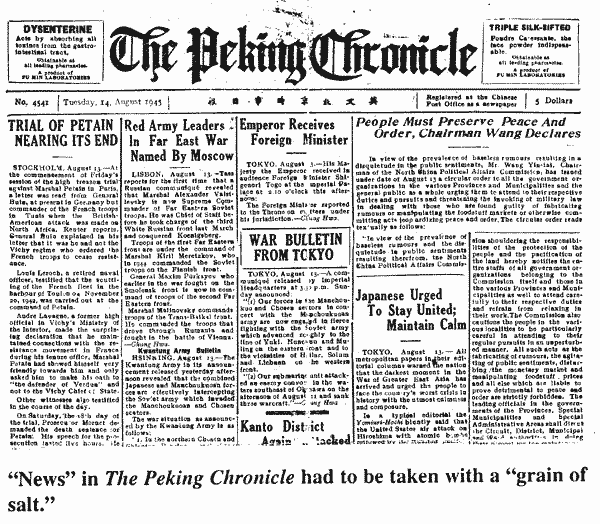
... April 1943 ...
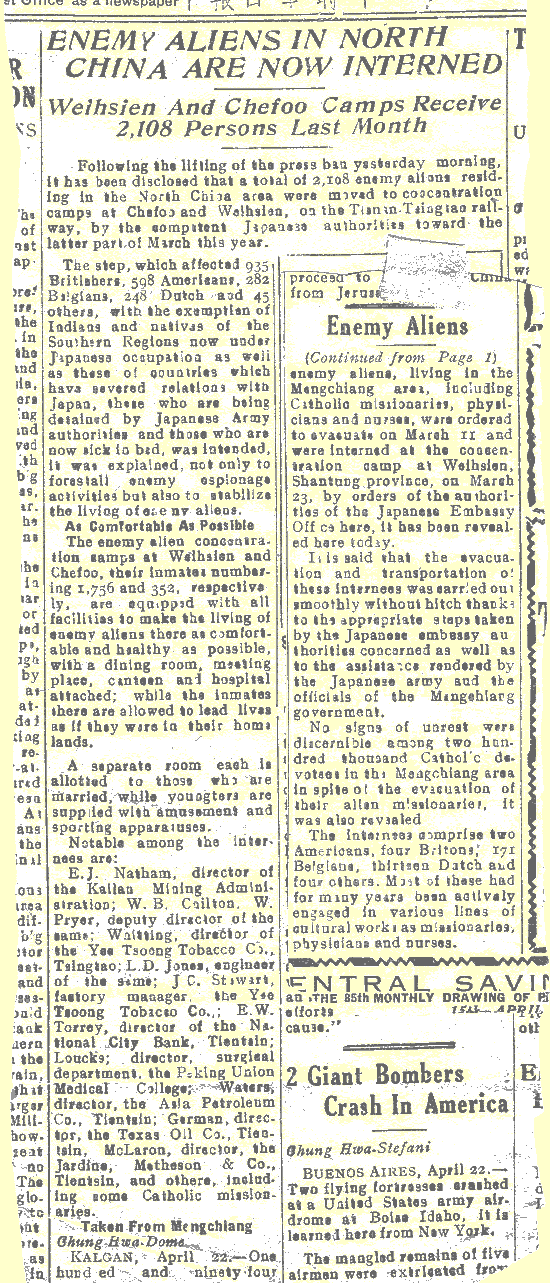
ENEMY NATIONALS IN NORTH CHINA ARE NOW INTERNED
Weihsien And Chefoo Camps Receive 2,108 Persons Last Month
Following the lifting of the press ban yesterday morning, it has been disclosed that a total of 2,108 enemy aliens residing in the North China area were moved to concentration camps at Chefoo and Weihsien, on the Tientsin - Tsingtao railway, by the competent Japanese authorities toward the latter part of March this year.
The step which affected 935 Britishers, 598 Americans, 282 Belgians, 248 Dutch and 45 others, with the exemption of Indians and natives of the Southern Regions now under Japanese occupation as well as these of countries which have severed relations with Japan, these who are being detained by Japanese Army authorities and those who are now sick in bed, was intended, it was explained, not only to forestall enemy espionage activities but also to stabilize the living of enemy aliens.
As Comfortable As Possible
The enemy alien concentration camps at Weihsien and Chefoo, their inmates numbering 1,756 and 352, respectively, are equipped with all facilities to make the living of enemy aliens there as comfortable and healthy as possible, with a dining room, meeting place, canteen and hospital attached; while the inmates there are allowed to lead lives as if they were in their homelands.
A separate room each is allotted to those who are married while youngsters are supplied with amusement and sporting apparatuses.
Notable among the internees are:
E.J. Natham, director of the Kailan Mining Administration; W.B. Cailton. W. Pryer, deputy director of the same; Waitting, director of the Yes Tsoong Tobacco Co. Tsingtao; L.D. Jones, engineer of the same; J.C. Stewart, factory manager of the Yse Tsoong Tobacco Co.; E.W. Torrey, director of the National City Bank, Tientsin; Loucks, director surgical department of the Peking Union Medical College; Waters, director of the Asia Petroleum Co., Tientsin; German director, the Texas Oil Co., Tientsin, McLaren, director, the Jardine, Matheson & Co., Tientsin, and others, including some Catholic missionaries ...
Taken from Mangchiang
Chung Hwa Dome
Kalgan, April 22. - One hundred and ninety-four proceeded to [smudge] China from Jerusalem ...
ENEMY ALIENS
(Continued from Page 1)
... enemy aliens, living in the Menchiang area, including Catholic missionaries, physicians and nurses, were ordered to evacuate on March 11 and were interned at the concentration camp at Weihsien, Shantung province, on March 23, by orders of the authorities of the Japanese Embassy Office here, it has been revealed here today.
It is said that the evacuation and transportation of these internees were carried out smoothly without hitch thanks to the appropriate steps taken by the Japanese embassy authorities concerned as well as to the assisstance rendered by the Japanese army and the officials of the Mengchiang government.
No signs of unrest were discernible among two hundred thousand Catholic devoted in the Mengchiang area in spite of the evacuation of their alien missionaries, it was also revealed.
The internees comprises two Americans, four Britons, 171 Belgians, thirteen Dutch and four others. Most of these had for many years been actively engaged in various lines of cultural work as missionaries, physicians and nurses.
#
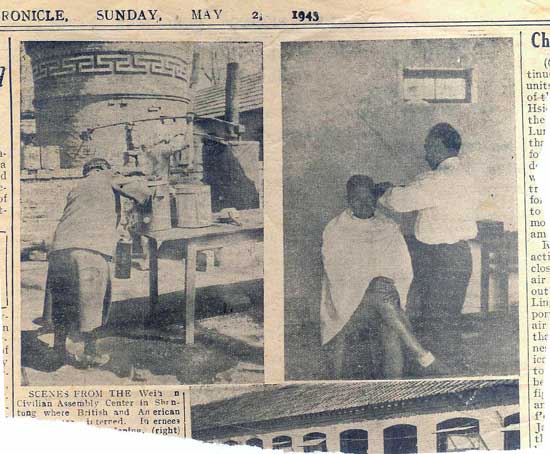
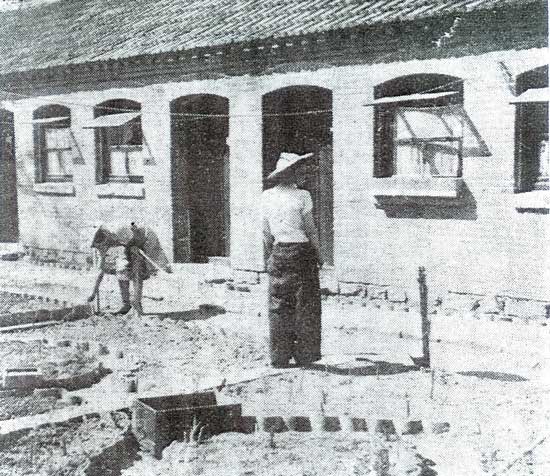


Journal de Shanghaï, 24 août 1943
Les internés de Weihsien dans le Chantong mènent une existence paisible
Pékin, 23 août — M. Wedeking, reporter du "Peking Chronicle" a visité le camp de Weihsien dans le Chantong où ont été rassemblés 1794 ressortissants ennemis appartenant à quatorze nationalités.
Les internés mènent une existence calme et paisible. Ils dirigent leurs propres affaires par l'intermédiaire de comités élus. Le comité médical s'occupe de l'état sanitaire du camp, le comité du bien-être veille à l'éducation et pourvoit aux distractions, le comité des finances et des affaires générales exerce un contrôle général, le comité du ravitaillement est chargé du ravitaillement et de la cantine et un comité de discipline répartit le travail et règle les questions de logement.
Les internés à l'exception des enfants et des personnes âgées sont astreints à deux heures et demie de travail par jour. Le reste du temps, ils sont absolument libres de leur temps.
Les enfants doivent se rendre à l'école où enseignent des missionnaires catholiques et protestants.
L'hôpital est situé dans un bâtiment bien aéré et bien éclairé. Dix-sept médecins, dont certains d'éminents spécialistes et trente infirmières diplômées y travaillent. L'hôpital comporte une salle d'opération et une section d'obstétrique. —
Central Press.


in a Shanghai newspaper, August 24, 1943
Weihsien internees in Shantung lead peaceful lives
Peking, August 23 - Mr. Wedeking, reporter for the Peking Chronicle, visited the Weihsien camp in Shantung, where 1,794 enemy nationals of fourteen nationalities are gathered.
The internees lead a calm and peaceful existence. They run their own affairs through elected committees. The medical committee takes care of the sanitary state of the camp, the welfare committee takes care of education and provides entertainment, the finance and general affairs committee exercises general control, the supply committee is responsible for food supplies and the canteen and a disciplinary committee distributes work and settles housing issues.
Internees, with the exception of children and the elderly, are required to work two and a half hours per day. The rest of the time, they are absolutely free with their time.
Children must go to school where Catholic and Protestant missionaries teach.
The hospital is located in a well ventilated and well lit building. Seventeen doctors, some of whom are eminent specialists and thirty qualified nurses, work there. The hospital has an operating room and an obstetrics section. -
Central Press.

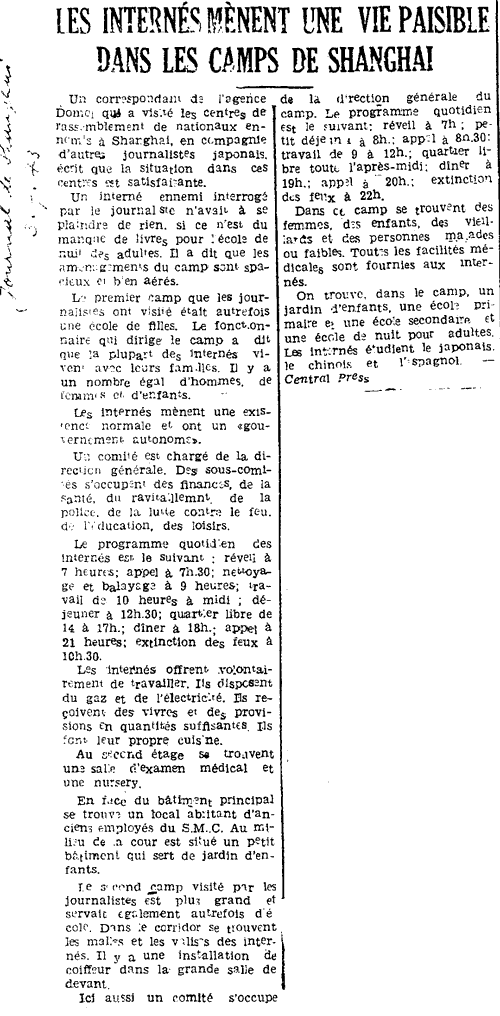
Journal de Shanghai, le 3 juillet 1943
LES INTERNÉS MÈNENT UNE VIE PAISIBLE DANS LES CAMPS DE SHANGHAI
Un correspondant de l'agence Domei qui a visité les centres de rassemblement de nationaux ennemis à Shanghai en compagnie d'autres journalistes japonais écrit que la situation dans ces centres est satisfaisante.
Un interné ennemi interrogé par le journaliste n'avait à se plaindre de rien si ce n'est du manque de livres pour l'école de nuit des adultes. Il a dit que les aménagements du camp sont spacieux et bien aérés.
Le premier camp que les journalistes ont visité était autrefois une école de filles. Le fonctionnaire qui dirige le camp a dit que la plupart des internés vivent avec leurs familles. Il y a un nombre égal d'hommes, de femmes et d'enfants.
Les internés mènent une existence normale et ont un "gouvernement autonome".
Un comité est chargé de la direction générale. Des sous-comités s'occupent des finances, de la santé, du ravitaillement, de la police, de la lute contre le feu, de l'éducation, des loisirs.
Le programme quotidien des internés est le suivant: réveil à 7 heures; appel à 7h.30; nettoyage et balayage à 9 heures; travail de 10 heures à midi; déjeuner à 12h.30; quartier libre de 14 à 17 heures; dîner à 18h; appel à 21 heures; extinction des feux à 10h.30.
Les internés offrent volontairement de travailler. Ils disposent du gaz et de l'électricité. Ils reçoivent des vivres et des provisions en quantité suffisante. Ils font leur propre cuisine.
Au second étage se trouvent une salle d'examen médical et une nursery.
En face du bâtiment principal se trouve un local abritant d'anciens employés du S.M.C. Au milieu de la cour est situé un petit bâtiment qui sert de jardin d'enfants.
Le second camp visité par les journalistes est plus grand et servait également autrefois d'école. Dans le corridor se trouvent les malles et les valises des internés. Il y a une installation de coiffeur dans la grande salle de devant.
Ici aussi un comité s'occupe de la direction générale du camp. Le programme quotidien est le suivant: réveil à 7h; petit-déjeuner à 8h; appel à 8h.30; travail de 9 à 12h; quartier libre toute l'après-midi; dîner à 19h; appel à 20h;extinction des feux à 22h.
dans ce camp se trouvent des femmes des enfants, des vieillards et des personnes malades ou faibles. Toutes les facilités médicales sont fournies aux internés.
On trouve dans le camp, un jardin d'enfants, une école primaire et une école secondaire et une école de nuit pour les adultes. Les internés étudient le japonais, le chinois et l'espagnol.
Central Press.


from a Shanghai Newspaper, July 3, 1943
INTERNEES LEAD A PEACEFUL LIFE IN THE SHANGHAI CAMPS
A Domei correspondent who visited enemy alien assembly centres in Shanghai with other Japanese journalists writes that the situation in these centres is satisfactory.
An enemy internee interviewed by the journalist had nothing to complain about except the lack of books for the adult night school. He said that the camp facilities are spacious and well ventilated.
The first camp that journalists visited was once a girls' school. The official who runs the camp said that most of the internees live with their families. There are an equal number of men, women and children.
Internees lead a normal life and have "autonomous government".
A committee is responsible for general management. Subcommittees deal with finance, health, supplies, police, firefighting, education, recreation.
The daily program for internees is as follows: waking up at 7 a.m.; call at 7.30 a.m .; cleaning and sweeping at 9 o'clock; work from 10 a.m. to noon; lunch at 12.30 p.m .; free occupation from 2 to 5 p.m.; dinner at 6 p.m .; call at 9 p.m .; lights out at 10.30 p.m.
Internees volunteer to work. They have gas and electricity. They receive sufficient food and supplies. They do their own cooking.
On the second floor, there is a medical examination room and a nursery.
Opposite the main building is a room housing former employees of S.M.C. In the middle of the courtyard is a small building that serves as a kindergarten.
The second camp visited by journalists is larger and also once served as a school. In the corridor are the trunks and suitcases of the internees. There is a hairdresser facility in the large front room.
Here too a committee takes care of the general direction of the camp. The daily program is as follows: wake up at 7a.m.; breakfast at 8 a.m .; call at 8.30 a.m .; work from 9 to 12h; free time all afternoon; dinner at 7 p.m .; call at 8 p.m .; lights out at 10 p.m.
In this camp are women, children, old people and sick or weak people. All medical facilities are provided to the internees.
There is a kindergarten, a primary school and a secondary school and a night school for adults in the camp. Internees study Japanese, Chinese and Spanish.
Central Press
#
[click here] ... for more ! 

Central Press.


in a Shanghai newspaper, August 24, 1943
Weihsien internees in Shantung lead peaceful lives
Peking, August 23 - Mr. Wedeking, reporter for the Peking Chronicle, visited the Weihsien camp in Shantung, where 1,794 enemy nationals of fourteen nationalities are gathered.
The internees lead a calm and peaceful existence. They run their own affairs through elected committees. The medical committee takes care of the sanitary state of the camp, the welfare committee takes care of education and provides entertainment, the finance and general affairs committee exercises general control, the supply committee is responsible for food supplies and the canteen and a disciplinary committee distributes work and settles housing issues.
Internees, with the exception of children and the elderly, are required to work two and a half hours per day. The rest of the time, they are absolutely free with their time.
Children must go to school where Catholic and Protestant missionaries teach.
The hospital is located in a well ventilated and well lit building. Seventeen doctors, some of whom are eminent specialists and thirty qualified nurses, work there. The hospital has an operating room and an obstetrics section. -
Central Press.


Journal de Shanghai, le 3 juillet 1943
LES INTERNÉS MÈNENT UNE VIE PAISIBLE DANS LES CAMPS DE SHANGHAI
Un correspondant de l'agence Domei qui a visité les centres de rassemblement de nationaux ennemis à Shanghai en compagnie d'autres journalistes japonais écrit que la situation dans ces centres est satisfaisante.
Un interné ennemi interrogé par le journaliste n'avait à se plaindre de rien si ce n'est du manque de livres pour l'école de nuit des adultes. Il a dit que les aménagements du camp sont spacieux et bien aérés.
Le premier camp que les journalistes ont visité était autrefois une école de filles. Le fonctionnaire qui dirige le camp a dit que la plupart des internés vivent avec leurs familles. Il y a un nombre égal d'hommes, de femmes et d'enfants.
Les internés mènent une existence normale et ont un "gouvernement autonome".
Un comité est chargé de la direction générale. Des sous-comités s'occupent des finances, de la santé, du ravitaillement, de la police, de la lute contre le feu, de l'éducation, des loisirs.
Le programme quotidien des internés est le suivant: réveil à 7 heures; appel à 7h.30; nettoyage et balayage à 9 heures; travail de 10 heures à midi; déjeuner à 12h.30; quartier libre de 14 à 17 heures; dîner à 18h; appel à 21 heures; extinction des feux à 10h.30.
Les internés offrent volontairement de travailler. Ils disposent du gaz et de l'électricité. Ils reçoivent des vivres et des provisions en quantité suffisante. Ils font leur propre cuisine.
Au second étage se trouvent une salle d'examen médical et une nursery.
En face du bâtiment principal se trouve un local abritant d'anciens employés du S.M.C. Au milieu de la cour est situé un petit bâtiment qui sert de jardin d'enfants.
Le second camp visité par les journalistes est plus grand et servait également autrefois d'école. Dans le corridor se trouvent les malles et les valises des internés. Il y a une installation de coiffeur dans la grande salle de devant.
Ici aussi un comité s'occupe de la direction générale du camp. Le programme quotidien est le suivant: réveil à 7h; petit-déjeuner à 8h; appel à 8h.30; travail de 9 à 12h; quartier libre toute l'après-midi; dîner à 19h; appel à 20h;extinction des feux à 22h.
dans ce camp se trouvent des femmes des enfants, des vieillards et des personnes malades ou faibles. Toutes les facilités médicales sont fournies aux internés.
On trouve dans le camp, un jardin d'enfants, une école primaire et une école secondaire et une école de nuit pour les adultes. Les internés étudient le japonais, le chinois et l'espagnol.
Central Press.


from a Shanghai Newspaper, July 3, 1943
INTERNEES LEAD A PEACEFUL LIFE IN THE SHANGHAI CAMPS
A Domei correspondent who visited enemy alien assembly centres in Shanghai with other Japanese journalists writes that the situation in these centres is satisfactory.
An enemy internee interviewed by the journalist had nothing to complain about except the lack of books for the adult night school. He said that the camp facilities are spacious and well ventilated.
The first camp that journalists visited was once a girls' school. The official who runs the camp said that most of the internees live with their families. There are an equal number of men, women and children.
Internees lead a normal life and have "autonomous government".
A committee is responsible for general management. Subcommittees deal with finance, health, supplies, police, firefighting, education, recreation.
The daily program for internees is as follows: waking up at 7 a.m.; call at 7.30 a.m .; cleaning and sweeping at 9 o'clock; work from 10 a.m. to noon; lunch at 12.30 p.m .; free occupation from 2 to 5 p.m.; dinner at 6 p.m .; call at 9 p.m .; lights out at 10.30 p.m.
Internees volunteer to work. They have gas and electricity. They receive sufficient food and supplies. They do their own cooking.
On the second floor, there is a medical examination room and a nursery.
Opposite the main building is a room housing former employees of S.M.C. In the middle of the courtyard is a small building that serves as a kindergarten.
The second camp visited by journalists is larger and also once served as a school. In the corridor are the trunks and suitcases of the internees. There is a hairdresser facility in the large front room.
Here too a committee takes care of the general direction of the camp. The daily program is as follows: wake up at 7a.m.; breakfast at 8 a.m .; call at 8.30 a.m .; work from 9 to 12h; free time all afternoon; dinner at 7 p.m .; call at 8 p.m .; lights out at 10 p.m.
In this camp are women, children, old people and sick or weak people. All medical facilities are provided to the internees.
There is a kindergarten, a primary school and a secondary school and a night school for adults in the camp. Internees study Japanese, Chinese and Spanish.
Central Press
#
[click here] ... for more ! 





